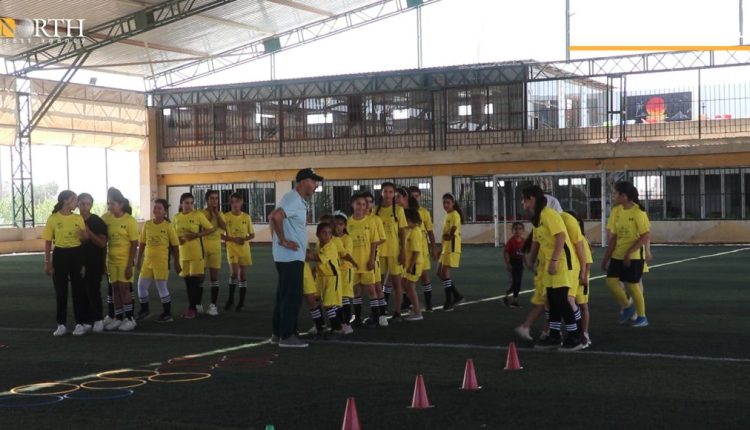
By Nalin Ali
QAMISHLI, Syria (North Press) – In the vibrant city of Qamishli in northeastern Syria a growing number of female athletes are defying societal norms and pursuing their passion for soccer.
Dozens of young women train diligently at a local stadium, breaking through stereotypes as they join forces to compete in both local and international tournaments.
Among them is Shevin Muhammad, who puts on her sportswear with pride before stepping onto the field alongside her teammates.
Over the past few years, perceptions of women in sports have shifted significantly within the community. More and more girls are taking to the field and secure titles and make their mark in various competitions.
Encouragement
Muhammad, a female soccer player, says that many in her family are interested in sports and practice it, which encouraged her to play soccer.
She adds to North Press in previous years, sports were often deemed unsuitable for girls. Many families were hesitant to allow their daughters to engage in activities like soccer, leading to a culture of shyness and apprehension around female participation in sports.
Muhammad emphasizes that as more girls started to enter stadiums and pursue their sporting interests, there has been a noticeable increase in interest and support from coaches and sports committees of the authorities.

Maria al-Ahmad, a passionate female soccer player, shares how her early experiences of accompanying her father to soccer matches sparked her love for the sport and inspired her to play as a hobby.
She dreams of competing in international women’s tournaments and joining professional teams. Al-Ahmad says that women’s soccer has evolved, highlighting the emergence of dedicated teams and experienced coaches, which significantly enhances their learning opportunities.
Aya Ismail, another dedicated player, points out the contrasting attitudes towards girls’ participation in soccer within families.
While some families strictly prohibit their daughters from playing, asserting that the sport is not suitable for girls, others provide enthusiastic encouragement and support for their daughters to participate in matches, play soccer, and aspire to join international teams.
She notes that witnessing girls winning titles in tournaments serves as a powerful motivator for others to engage in sports and elevate their skills to new levels.
Great difficulties
Shangal Hamo, an official in the Women’s Sport Office of the Youth and Sports Board, affiliated with the Autonomous Administration of North and East Syria (AANES), highlights the significant transformation in women’s sports in the region since the onset of the Syrian crisis.
She notes that prior to the crisis, women’s sports were largely unfamiliar to the community, and many families were hesitant to allow their daughters to participate in sports, particularly soccer.
Hamo explains the Office faced numerous challenges in forming and training teams for young women due to this low turnout.
She emphasizes, however, that the situation has improved. Today, hundreds of young women are actively participating in teams and achieve considerable success in local tournaments.
Limited support
Hamo stresses their commitment to securing and providing everything the players need within their available resources. She highlights the necessity for increased support for women’s sports, which is essential for expanding participation in international tournaments.
She indicates a significant cultural shift, explaining that more families are now encouraging their daughters to join the Sports Union of the AANES, a stark contrast to the initial years of its establishment.
Hamo hopes that in the future women’s teams will compete in international tournaments to represent the women of Northeastern Syria.
